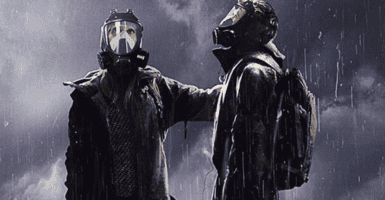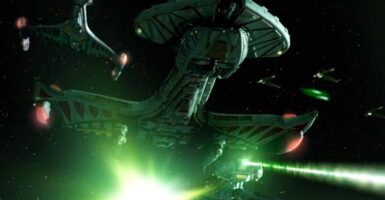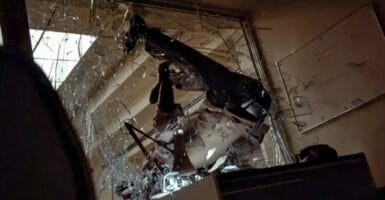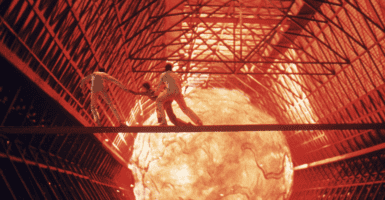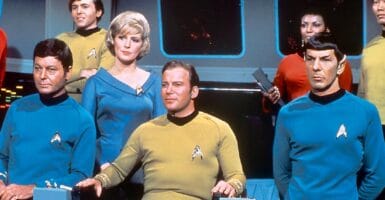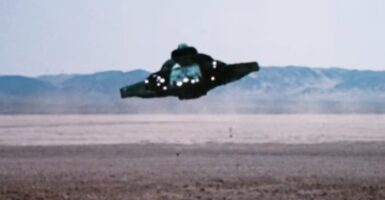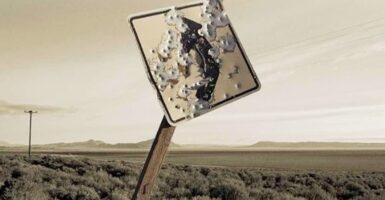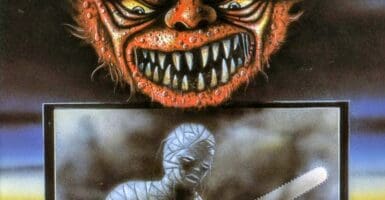Ron Moore On Why TV Star Trek Is Better Than Movie Star Trek
This article is more than 2 years old
 Having worked on Star Trek: The Next Generation, Deep Space Nine, and Voyager, not to mention shepherding Syfy’s Battlestar Galactica reboot, it’s safe to say Ron Moore knows a thing or two about televised science fiction, and he knows even more about televised Star Trek. With J.J. Abrams’ Trek movies raking in the box office on the big screen, it seems inevitable that Trek will eventually return to the small one. And in Ron Moore’s opinion, the TV format is where Trek really shines.
Having worked on Star Trek: The Next Generation, Deep Space Nine, and Voyager, not to mention shepherding Syfy’s Battlestar Galactica reboot, it’s safe to say Ron Moore knows a thing or two about televised science fiction, and he knows even more about televised Star Trek. With J.J. Abrams’ Trek movies raking in the box office on the big screen, it seems inevitable that Trek will eventually return to the small one. And in Ron Moore’s opinion, the TV format is where Trek really shines.
Speaking with StarTrek.com, Moore explains why “the features are great,” but Star Trek better lends itself to the format and structure of a TV series.
I think that Star Trek, in its DNA, is a television show. The features are great. They’re a lot of fun and they’ve certainly opened it up to a lot of different audiences, but the features all are basically atypical episodes, if you think about it. The features are very big action-adventure movies, lots of spectacle, run and jump, shoot-em-up and blowing things up. The fate of the Earth, or the universe itself, is always at stake. It’s always about the captain, and one other character has a strong B-story, and everyone else sort of has very small roles beyond that. But Star Trek, as originally conceived, and as you saw play out in all the other series, was really a morality play every week, and it was about an ensemble of players. They were exploring science fiction ideas, sociological ideas and moral ideas. That’s really what the shows are about, and the movies are just pitched in a different way and at a different audience.
The [TV series] will do a story where the captain is split in two by a transporter accident and one half is evil and one half is good, and the whole story is about where does the nature of a man’s strength come from? What makes a man a man? Is it his good side? His bad side? Or how the two come together to make something greater than the sum of its parts? The movies will never do that. They’ll never do a day-in-the-life story with Data [the excellent season 4 episode “Data’s Day”] or something like “Lower Decks,” where you go explore the other characters. They’ll never do all the things that all of us who are fans fell in love with this franchise for. So I think, at some point, Star Trek will return to television, and that would be great. I’d love to watch the weekly adventures again just because it gives you an opportunity to explore lots of other things besides the action-adventure component.
The man’s got a point. While there have been some amazing and bombastic action sequences in the Trek series and movies, at its best Roddenberry’s creation has always been about ideas and difficult choices. For the Original Series, Roddenberry enlisted some of the best science fiction writers of that era, including Harlan Ellison and Theodore Sturgeon, and it shows. One of the reasons Abrams’ take on Trek infuriates some long-time fans is because it — so far at least — has leaned heavily on the action and not much on the ideas. I’d love to see that change with Into Darkness, but I’d love even more to see a new Trek TV series, whether set in the original timeline or the new one.
From a business standpoint, it would be very surprising for Paramount to launch a new series set in the classic Trek universe, but you never know. However, I think that a show in the new timeline could still excel at all the things Trek does well. There’s nothing fundamentally broken with the new timeline, it’s just that Abrams and his writers put together a sloppy script. In the right hands, with the right talent, a new Abrams-verse Trek could get back to basics and benefit from the “anything goes” nature of the altered timeline.
